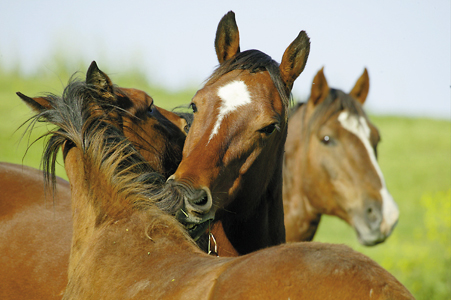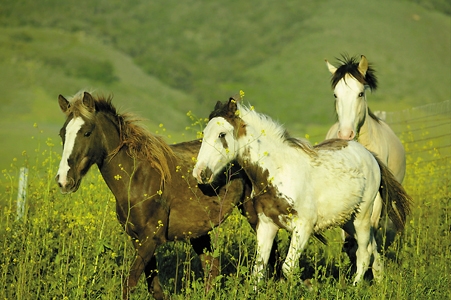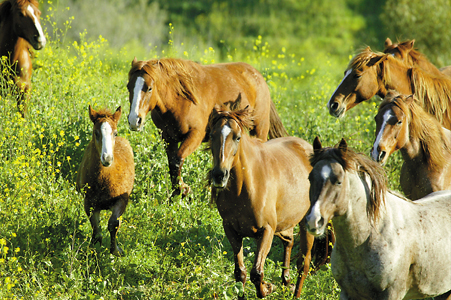Return to Freedom, an American Wild Horse sanctuary presently located in Santa Barbara County, California, is unique in its wild horse rescue effortsbecause of a strong commitment, in fact a mandate, to keep bonded, natural herd groups together in sanctuary just as they were found in the wild. In this regard, the non-profit 501(c)3 corporation founded in 1997 by Neda DeMayo stands apart in its effort to establish a natural living museum that preserves the story of the natural behavior and evolutionary pattern of the American Wild Horse.
The importance of maintaining natural herd groups is something that many horse rescue programs overlook. Horses are herd animals, and hereditarily they have depended on their family groups for survival. When separated, wild horses have been know to panic and sometimes even run themselves to death. Wild horses (also called "Mustangs") socialize in a form of intelligence we may never completely understand. Herd life places special demands on the horse, special jobs, and a social structure that does not include the human. Genetic diversity is part of the process. Programs that forcefully separate wild horses from their herd for adoption often fail due to exceptional skill and effort that is required to domesticate a wild horse. But more importantly, the disintegration of the horse's natural family group represents the loss of a culture, of a natural society, and of the evolutionary traits that spring from this society.
 In North America, genetic blood typing has established that some wild horse herds have historical, cultural, and genetic significance. For example, certain wild herd blood lines can be traced directly to original Spanish and primitive Iberian bloodlines. Without preservation, these "rare breeds" are at risk of disappearing forever. Return to Freedom currently hosts six original "rare breed" family group herds at its Santa Barbara County facility. In North America, genetic blood typing has established that some wild horse herds have historical, cultural, and genetic significance. For example, certain wild herd blood lines can be traced directly to original Spanish and primitive Iberian bloodlines. Without preservation, these "rare breeds" are at risk of disappearing forever. Return to Freedom currently hosts six original "rare breed" family group herds at its Santa Barbara County facility.
Neda DeMayo passionately elaborates on the value of preserving this extraordinary aspect of our culture. She says, "Horses are a nomadic civilization that predate the human species by about 55 million years. The species evolved to the modern Caballine horse (Equus Caballus) on the North American continent 1.6 million years ago. The horse left and returned several times over these years. When the horses stepped off the boats at Vera Cruz in the late 1500's, they were returning home again. Over the past few hundred years, America's free ranging horses have evolved back into a natural state, creating The American Wild Horse of today."
At Return to Freedom we can get a glimpse into the characteristics, patterns and choices that horses living in the wild make. But for DeMayo, preservation of the American Wild Horse is more than the opportunity to learn about the horse, his nature, and how he has evolved. It is also about recognizing the horse as an important aspect of American culture.
 "We want to honor the horse as an integral part of not only the American wild life system, but we also believe that he has earned special status by having woven himself into everything that is American. The ancestors of these horses helped us build this country. They carried us across the land from east to west. They took us forward into battle; they pulled our plows; they drove our cattle. The horse holds a mythical status for Americans; he touches us deeply, symbolically, archetypically. He touches our hearts." In 1971, Congress passed an act that declares that "wild free-roaming horses and burros are living symbols of the historic pioneer spirit of the West." "We want to honor the horse as an integral part of not only the American wild life system, but we also believe that he has earned special status by having woven himself into everything that is American. The ancestors of these horses helped us build this country. They carried us across the land from east to west. They took us forward into battle; they pulled our plows; they drove our cattle. The horse holds a mythical status for Americans; he touches us deeply, symbolically, archetypically. He touches our hearts." In 1971, Congress passed an act that declares that "wild free-roaming horses and burros are living symbols of the historic pioneer spirit of the West."
The wild horse's freedom to roam the land, the freedom of choice, is symbolic of the freedom that America stands for. And what allows the horse to have this freedom? Horses need a place to be (the land.) They need food and water. And they need each other.
DeMayo points out other benefits in preserving the herd life of the American Wild Horse. Preserving the herd also preserves the land. Horses are ecologically beneficial. They will re-seed the land rather than to overgraze unless forced into doing so by land shortage. They provide fire protection, and they break open snow that allows other animals to graze. "We believe if the horse is healthy, the land is healthy. The presence of wild horses will preserve open spaces for future generations.
Return to Freedom works with local chapters of the U.S. Department of Agriculture and U.S. Fish and Game,as well as environment scientists and volunteers to provide ongoing management solutions for habitat restoration, erosion, and protection of sensitive habitats and endangered species." Return to Freedom's sanctuary management program embodies both vision and philosophy. Philosophically, it is the willingness to allow whatever IS to be whatever it is, naturally, that this willingness, compassion, understanding is what is needed in relationship to horses, to each other,and to the planet. As a means to activate this philosophy, Return to Freedom's focus is educational. A number of programs, clinics, and intensives are offered to the public; subjects include wild horse observation, natural healing, herd behavior, the art of listening, sanctuary management, habitat restoration, equine care, and insight into animal communication. Youth programs also focus on creative expression and the arts.
 DeMayo believes that there's something deep down in all of us that wants what is "natural," and pure, the way God made it, that each of us is seeking some form of connection of what represents to us the natural world. Much of what inspires so many urban dwellers to buy land, to have a place in the country is this deep drive to be in contact with what is pure and unadulterated, with something that is free from the thrust of domesticity. DeMayo believes that there's something deep down in all of us that wants what is "natural," and pure, the way God made it, that each of us is seeking some form of connection of what represents to us the natural world. Much of what inspires so many urban dwellers to buy land, to have a place in the country is this deep drive to be in contact with what is pure and unadulterated, with something that is free from the thrust of domesticity.
Return to Freedom answers this calling. DeMayo's intention is that people will visit the sanctuary and experience the soul of the horse, learn about his heritage, why he has evolved as he has, and what his primary needs are. Then upon returning to the world of the domesticated horse, she hopes that one will bring greater compassion, understanding and respect for who the horse is and where came from.
Today, the American Wild Horse is facing a crises. The government is requiring the Bureau of Land Management (BLM) to remove approximately 26,000 wild horses from public lands by the year 2005. Two hundred years ago, there were over 2 million wild horses in North America. Three years ago, the BLM estimated that there were only 48,000 wild horses remaining on public lands in the western states. Since then, thousands have been removed and herd family groups have been decimated. Adoption programs for these horses cannot hope to place them all and many will end up suffering or slaughtered.
Return to Freedom offers alternatives at this critical juncture in the fate of the American Wild Horse. Having developed extensive and innovative methods for sanctuary management that include holistic and ecological approaches, Return to Freedom's present need is for land! With a goal of acquiring over 20,000 acres, the "Wild Horse Land Trust & Conservancy" allows for funds to be donated that are earmarked exclusively for this land expansion effort. Return to Freedom has co-founded the Living History Preservation Council, which will introduce the American Wild Horse Preservation Incentive in order to provide financial incentives to grazing permit holders who allow wild horses to remain where they are.
Far and wide, hearts have been touched by the vision and philosophy held at Return to Freedom. The list of sponsors and donors is growing and includes a number of celebrities. Hilary Duff, successful actress and singer best known as star of the popular "Lizzie McGuire" recently visited the ranch. She is Return to Freedom's official "Youth Ambassador." And Return to Freedom has been widely acclaimed as home to "Spirit," the Kiger Mustang who served as role model for the animated film "Spirit: Stallion of the Cimarron," which was released in summer of 2002. Spirit is also serving as one of Return to Freedom's Ambassador horses, championing the cause of the American Wild Horse, whose plight is echoed in the film script that brought tears to the eyes of both children and adults. After making the film, DreamWorks searched the nation for an appropriate home for Spirit. Return to Freedom was chosen, because of its philosophy and its educational focus.
Support for Return to Freedom can be made in a variety of ways. One can become a donor or sponsor, sponsor a wild herd, purchase or donate acreage towards the expanding Wild Horse Land Trust, volunteer at the Sanctuary, participate in some of the programs and clinics, or "take action" and work for new legislation.
For details,
visit www.returntofreedom.org or call (805)735-3246
|